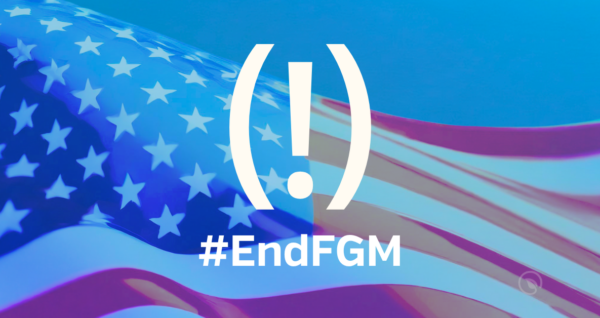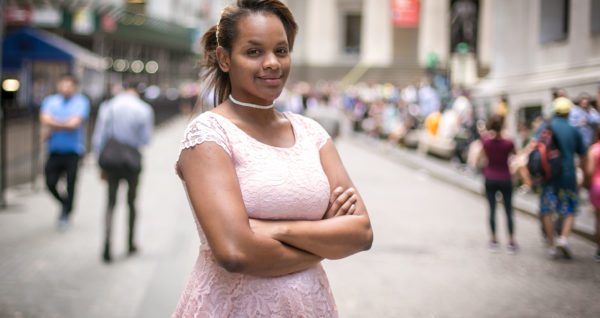FGM is happening in our own backyard, threatening the health and lives of more than half a million Americans.
Every year, on February 6, Sanctuary joins thousands of advocates across the world to observe the International Day of Zero Tolerance for Female Genital Mutilation (FGM)—A form of gender-based violence endured by more than 200 million women and girls worldwide that involves the partial or complete removal of the external female genitalia or other injury to the female genital organs for non-medical reasons.
What is FGM?
Female genital mutilation is internationally recognized as a violation of human rights. It is a universal practice, not prescribed by any religious teachings, typically performed on girls from infancy through puberty. Victims of FGM often suffer from severe, long-lasting physical and psychological harm, and many have lost their lives to this form of violence.
Immediate complications and health risks associated with this practice can include severe pain, excessive bleeding, swelling of genital tissue, fever, infection, urinary problems, injury to surrounding genital tissue, shock, and death. Long-term consequences can include urinary, vaginal, and menstrual issues, painful genital scarring and keloids, decreased sexual pleasure, reduced sexual functioning, and increased risk of complications during childbirth, as well as depression, anxiety, and post-traumatic stress disorder (“PTSD”), among other psychological problems.
Prevalence of FGM in the United States
Due to the secretive nature of FGM and the lack of resources allocated to the research of this practice, it is impossible to say for sure how many girls in the U.S. are at risk of female genital mutilation. Nonetheless, we know from experience that FGM is taking place in our own backyard, at alarming rates.
According to the Center for Disease Control (CDC), more than 513,000 women and girls in the U.S. have experienced or are currently at risk of undergoing this practice. This is more than three times higher than an earlier estimate based on 1990 data. Based on survivors’ testimony and research conducted by Sanctuary and other anti-FGM advocates, we believe that the incidence of FGM for women and girls in the United States may be even higher. Our data shows that FGM is being practiced in New York, New Jersey, Pennsylvania, Texas, Colorado, Washington, California, Georgia, Michigan, Minnesota, Kentucky, Kansas, and Washington, D.C. It also suggests an even greater number of girls from the U.S. are taken abroad to be subjected to this violence, a practice known as “vacation cutting.” Today, however, there is no federal prohibition on this rampant violation of women’s rights in the United States.
FGM Legislation in the United States
The U.S. stands with Australia, the United Kingdom, Canada, New Zealand and thirteen other countries in Western Europe in banning female genital mutilation. The practice was first banned by Congress in 1996 with the adoption of the Prohibition of Female Genital Mutilation Act (18 U.S.C. § 116). Because this federal ban fell short in addressing the issue of vacation cutting, Sanctuary and fellow advocates fought to protect American girls abroad and succeeded. In 2013, the act was amended to outlaw the transport of women and girls out of the U.S. for the purpose of FGM.
The first blow to the federal FGM prohibition came in 2018, when the U.S. District Court for the Eastern District of Michigan returned a decision in the matter United States v. Nagarwala. In November of that year, Judge Friedman dropped most of the charges against the defendants, two doctors and four parents accused of mutilating the genitals of nine young girls. Five of the nine girls had been transported across state lines from Minnesota and Illinois (where state FGM prohibitions existed) to Michigan (where no state-level prohibition existed at the time). Prosecutors also estimated that Dr. Nagarwala and her accomplices may have cut as many as 100 girls. Judge Friedman, however, declared in his ruling that the 1996 federal ban was unconstitutional:
“FGM is a ‘local criminal activity’ which, in keeping with longstanding tradition and our federal system of government, is for the states to regulate, not Congress.” – Judge Bernard Friedman
The District Court’s decision was driven in part by the misguided belief that FGM cannot be a commercial activity and that the “market” for FGM was limited to the parents of the nine girls in this case. Fortunately, the STOP FGM Act of 2020, introduced by Rep. Sheila Jackson Lee (D-Texas) and signed by President Trump in January 2021, closed this loophole by amending the FGM statute to clarify the commercial nature of the practice. The new law also increased criminal penalties for performing FGM and expanded the scope of punishable offenses.
TAKE ACTION
Like other forms of gender-based violence, female genital mutilation is pervasive and cannot be eradicated based solely on state criminal laws. In addition to enacting new laws to deter U.S. families from practicing female genital mutilation, both at home and abroad, we must fight the misconceptions fueled by the profound lack of public awareness and research on the topic of FGM. Survivors from varying backgrounds—Christian, Muslim, American, West African, Indian, Pakistani, Egyptian—have courageously come forward to share their stories and advocate against the practice. It is time we listen to them.
Special thanks to our partners at Cleary Gottlieb Steen & Hamilton LLP for supporting our research and anti-FGM advocacy efforts.
—
Donate today and declare zero tolerance for FGM so that girls in 2022 and beyond can live free from violence.




